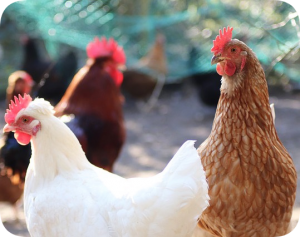 Last week, the U.S. Justice Department intervened in a class-action lawsuit against some of the nation’s largest poultry producers. The plaintiffs in the case claim that companies like Tyson Foods, Perdue Farms, and Pilgrim’s Pride conspired together to fix the price of chicken. Given that these allegations involve some of the top firms in a huge industry, the federal government decided to take over legal proceedings for the rest of the year. “The Justice Department wants to make sure they get first crack at all the possible evidence,” said law professor and antitrust expert Peter C. Carstensen. “Within six months, either they’ll present the case to the grand jury or they’ll decide there’s not enough there to qualify for proof of liability beyond a reasonable doubt.”
Last week, the U.S. Justice Department intervened in a class-action lawsuit against some of the nation’s largest poultry producers. The plaintiffs in the case claim that companies like Tyson Foods, Perdue Farms, and Pilgrim’s Pride conspired together to fix the price of chicken. Given that these allegations involve some of the top firms in a huge industry, the federal government decided to take over legal proceedings for the rest of the year. “The Justice Department wants to make sure they get first crack at all the possible evidence,” said law professor and antitrust expert Peter C. Carstensen. “Within six months, either they’ll present the case to the grand jury or they’ll decide there’s not enough there to qualify for proof of liability beyond a reasonable doubt.”
According to the food service firm that originally filed the suit, the offending companies colluded to “fix, raise, maintain, and stabilize” the price of broiler chickens. This type of bird accounts for 98 percent of the chicken meat sold annually in the U.S. In order to keep the population of broiler chickens stable enough to manipulate the market, the lawsuit alleges that producers destroyed flocks of breeder hens from 2008 to 2011. This allowed egg production to decrease which then led to a significant increase in the price of broiler chickens. To keep track of all this information, the lawsuit claims that producers took advantage of a highly detailed subscription data service called Agri Stats. This software allowed companies to share specific numbers regarding their chicken populations, enabling their supposed competitors to adjust production rates accordingly.
Because of these alleged market manipulations, the wholesale price of broiler chicken rose by 50 percent from 2008 to 2016 even though the cost of raising chickens had fallen dramatically. What’s more, the prices for pork and beef both dropped during that time, lending credibility to the lawsuit’s claim that defendants “knew and intended that their coordinated limitation and reduction in Broiler supply would artificially increase all Broiler prices.” Of course, the country’s leading chicken producers all deny these claims. A spokesperson for Tyson said that the Justice Department’s recent takeover of the case “does not change our view that there is simply no merit to the allegations that Tyson Foods colluded with competitors.” Meanwhile, Pilgrim’s Pride said that the company “strongly denies any allegations of anti-competitive conduct.”
Questions:
- How do price-fixing schemes harm consumers?
- Do you think the chicken companies accused of price-fixing should face criminal charges if the allegations against them prove to be credible? Why or why not?
